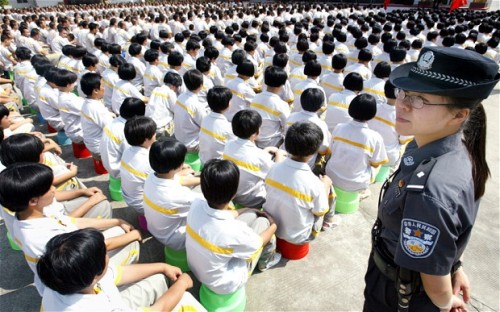
Chinese soldiers march past the Great Hall of the People after a pre-opening session of the National People’s Congress, China’s parliament, on March 4, 2013 in Beijing, China. Getty Images
By Le Li
BEIJING — The call came late on Monday night.
“More than 70 police raided our (guest house),” said former policeman He Zuhua. “Police are everywhere.”
His voice shook and he soon hung up, fearing that authorities would trace the call to the public telephone on the capital’s ragged outskirts. NBC News has been unable to reach him since.
He says he and a handful of former police officers are being pursued and detained by authorities after traveling to the capital to help shine a light on corruption within their ranks. The officers have joined droves of unhappy citizens who annually converge on Beijing in the hopes of petitioning their leaders for help during the annual National People’s Congress which started Monday. Each spring scores of petitioners are pulled from buses, trains, sidewalks, and simple hotels and locked up in secret locations, known as “black jails.”
The police stand out because all were once part of the justice system they seek to reform. According to two members of the group of 14 hoping to press for change, all of them are former police officers claiming to be themselves victims of pervasive corruption.
Their plight underscores how hard it is to combat patronage and graft in China, and how easy it was for insiders to fall from grace, said Hu Xingdou, a professor at Beijing Institute of Technology.
“In a country that lacks legal protection, it is not safe for anyone,” he said. “In China the judiciary, which is the base of anti-corruption, is not just.”
“Anyone can fall into a disadvantaged group from an advantaged group,” he added.
The crackdown on police petitioners came after China’s new leader Xi Jinping declared war on corruption, staking his name to promises that he would root out graft that infests everything from kindergarten admissions to the highest levels of government. He has called for anti-corruption campaigns ranging from banning luxury banquets to prohibiting floral displays and red carpet treatment for the official delegations.
According to He, he and the other former police officers from around the country were first rounded up on Feb. 24 as they ate together in a restaurant in Beijing. After 24 hours, three of the petitioners were taken from the detention facility with officials from their home provinces, He said. The rest “escaped,” he said.
“Corruption in the judicial system is the cause of all corruption,” he said before the Feb. 24 incident. “If we cannot change this, then China will collapse.”
Police officials contacted by NBC News denied any knowledge of a raid involving former officers.
He says he had worked in a county investigation unit in China’s central Henan province until 2002 when he refused to give false evidence in a trial involving local officials. He was sentenced to a year in prison on charges of corruption, He says.
Senior officials in Henan told him that his case lacked the proper evidence and promised a new investigation, He says. A decade after He lost his job and nothing had been done about the case.
Both of the police officers NBC News interviewed said they had traveled to Beijing to protest corruption within the judicial system, and hoped to present an open letter asking the delegates of the NPC to address the issue.
The NPC, made up of nearly 3,000 candidates is vested with lawmaking powers. In reality, it has acted mainly as a rubber stamp for the ruling Communist Party decisions. Over time, however, votes on measures or candidates nominated by the party have stopped being unanimous, signaling growing diversity if not the emergence of an opposition. Petitioners come from all over the country seeking redress for wrongs.
Tian Lan says she was once an award-winning senior police officer. After exposing a corruption scandal among local police in Northern Hebei province in 2002, Tian says she was jailed and tortured for a year. A Guangping court in Hebei charged Tian with six crimes including passing on states secrets, but the court failed to present evidence.
Since then Tian says she has been a petitioner. She says that to prevent her from petitioning, the local government has refused to renew her national identity card, which she needs to apply for a new job. Sometimes Tian has had to beg for food, she says.
“If people like me, who are inside the system, are mistreated like this, can you imagine how average citizens are treated?” Tian asked in tears.
Tian and He are not unique.
In the vast central city of Chonqqing, over 1,000 policemen, were recently given back their jobs as redress for mistreatment suffered at the hands of notoriously heavy-handed deposed police chief Wang Lijun. Wang has since been charged with crimes of abuse power for his role in a scandal that brought down charismatic Chongqing party boss Bo Xilai.
Before their arrest Tian and He told NBC they knew they might be detained before their demonstration.
“We are not here out of personal interest, but to fight against this nation’s corruption,” said He. “This country must change.”









